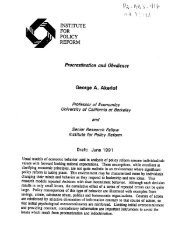(PDF, 101 mb) - USAID
(PDF, 101 mb) - USAID
(PDF, 101 mb) - USAID
You also want an ePaper? Increase the reach of your titles
YUMPU automatically turns print PDFs into web optimized ePapers that Google loves.
- :8: -<br />
These key issues were presented to senior <strong>USAID</strong> and CRS officials<br />
and agreed upon in separate meetings on June 8, 1987 just prior to the<br />
team's field investigation.<br />
In discussions with <strong>USAID</strong>/India regarding its expectatiou of<br />
this evaluation mission, the team was asked to make recommendations<br />
which would "help <strong>USAID</strong> be helpful to CRS".<br />
1.2 The Approach of the Team to this Evaluation<br />
The team's approach to this evaluation ,was a collaborative<br />
approach from the beginning.<br />
During its 4-day Team Planning (June 4 - 8, 1987), the team<br />
provided two briefings to CRS and to <strong>USAID</strong>, on June 5th and June 8th,<br />
for the purpose of soliciting CRS and <strong>USAID</strong> expectations of the<br />
evaluation, as well as their reactions on input regarding the team's<br />
evaluation approach and interview instruments (see Appendix B).<br />
As a standard procedure in its field visits to the CRS zonal<br />
offices, and to consignees and project holders, the team me<strong>mb</strong>ers<br />
provided a briefing at the start of each visit, and a debriefing at<br />
the conclusion of each visit. The intention of this approach was to<br />
ensure that information gathered through interviews at each level of<br />
program operations - project site, project holder, consignee, CRS<br />
zonal office - was shared laterally. Sharing team observations and<br />
information as such not only enabled team me<strong>mb</strong>ers to check their<br />
findings for accuracy, but also enabled CRS and its counterparts to be<br />
active partizipants in the "learning process" of the evaluation.<br />
At the conclusion of the team's field investigation, a 1-day<br />
seminar was held on July 1, 1987, for 12 representatives of the four<br />
CRS zonal offices and the New Delhi central office. The purpose of<br />
this seminar was to enable the CRS organization to arrive at a common<br />
understanding of FFW program issues and at appropriate measures to<br />
address them. The outcomes of this seminar are an integral part of<br />
this evaluation report, and its recommendations for program<br />
improvement. (See Appendix C.)<br />
In sun, the intention of the FFW evaluation team and its<br />
collaborative approach to this mission was to ensure that CRS and its<br />
counterparts felt a sense of participation in and ownership of the<br />
evaluation recommendations. The hoped for outcome of this approach is<br />
a "successful" evaluation - one in which the recommendations are<br />
valued and implemented.

















